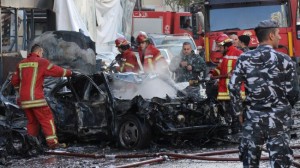 Lebanon�was jolted into a fresh political crisis on Friday after a car bomb in central�Beirut�assassinated Mohammad Shatah, a prominent political ally and adviser to former Prime Ministers�Saad Hariri�and Fouad Siniora. Such attacks have been a sad part of Lebanese political culture since the 1970s. The target, timing and location of the attack perhaps shed light on the perpetrators and purpose of the criminal deed, which killed at least four others and wounded over 70 people.
Lebanon�was jolted into a fresh political crisis on Friday after a car bomb in central�Beirut�assassinated Mohammad Shatah, a prominent political ally and adviser to former Prime Ministers�Saad Hariri�and Fouad Siniora. Such attacks have been a sad part of Lebanese political culture since the 1970s. The target, timing and location of the attack perhaps shed light on the perpetrators and purpose of the criminal deed, which killed at least four others and wounded over 70 people.The attack should probably be analyzed at three levels simultaneously: the domestic confrontation between the March 14 and March 8 coalitions; the armed conflict to bring down or save the Syrian regime; and the wider ideological conflict across the Middle East that is driven to a large extent by�Iran�and Saudi Arabia. Killing Shatah at this time and in the heart of March 14�s political terrain in West Beirut echoes elements of all three conflicts.
Lebanon has been gripped by political stagnation in its formal governance institutions for much of the past year, as the Parliament, Cabinet and�National Dialogue�have all been moribund due to a deep ideological divide between the Hariri-led March 14 forces that are close to�Saudi Arabia�and the Hezbollah-led March 8 camp that is close to�Syria�and Iran. Both rhetoric and violent actions have escalated between these two groups and their allies in Lebanon in the past year. They are also engaged in combat inside Syria, where�Hezbollah�and Iran support Bashar Assad�s regime and Lebanese Sunni Salafists are fighting to bring down the Damascus regime.
In recent months this confrontation has spread from its previously geographically contained context of Tripoli in north Lebanon, the border region of northeast Lebanon, and areas around Sidon in the south. Several rocket and car bomb attacks in the Hezbollah-controlled southern suburbs of Beirut in recent months, followed by the assassination of a leading military commander, took this battle directly into the party�s home district. The car bombing of the�Iranian Embassylast month escalated this trend, which shattered the previous apparently unwritten understanding that the two main camps in Lebanon would fight their battles in Syria or outside Beirut.
It would seem logical to see yesterday�s attack as the natural corollary to those recent attacks against Iranian and Hezbollah targets. Whoever carried it out may have intended to send twin messages: Those who attack March 8�s heartland should expect revenge attacks, and March 14 coalition is now fair game for such attacks.
The area of the attack is a jewel in the crown of the Hariri-led revitalization of central Beirut, and includes hundreds of millions of dollars in investments in luxury apartments, upscale hotels, waterfront marinas and commercial complexes. Former Prime Minister Saad Hariri�s home and the central meeting place of the March 14 group is also located nearby. The area symbolizes everything that March 14 promises for Lebanon�s future in terms of investments, jobs, prosperity and modernity. But once again it is the site of a major assassination that reminds all Lebanese that they still lack a consensus over the kind of future they seek for their country.
Shatah was the target because of his stature within March 14 as a leading thinker and international interlocutor, a close adviser and confidant of Saad Hariri and Siniora, and a critic of Syria, Hezbollah and March 8. In his last tweet hours before his death, he noted, � Hezbollah is pressing hard to be granted similar powers in security & foreign policy matters that Syria exercised in Lebanon for 15 yrs.�
This was a reference to the slow-motion discussions with President�Michel Sleiman�and others to form a new Lebanese government, which has been held up by disagreement between the two camps on how to allocate Cabinet seats, so that all parties are represented but neither of the two camps can dominate decision-making.
Accusations quickly materialized about who would have wanted to do this, from Syria and Hezbollah allies, to Saudi Arabia, to Salafist-takfiris, along with some voices wondering whether some other party did this to stoke sectarian tensions by making this appear like Syrian-Iranian- Hezbollah retaliation. Local reports also quoted March 14 sources as saying that Shatah's assassination could have been due to the approaching Jan. 16 start date of the�Special Tribunal�for Lebanon trial of five persons associated with Hezbollah who are accused of being involved in the 2005 assassination of the late Prime Minister Rafik Hariri. They added that Shatah was preparing for a televised interview about the Special Tribunal for Lebanon.
The tragedy of Lebanon remains that most of these theories could be plausible, but we will have to wait for the evidence and the investigation to provide more clarity on the possible perpetrators. The attack immediately sent shivers throughout Lebanon, which again lives in fear of serial retaliations. The symbolism of the bombing location means that the gloves are off, and any part of the country is now a fair target for the many killers out there.
By The Daily Star
The Iran Project is not responsible for the content of quoted articles.�










